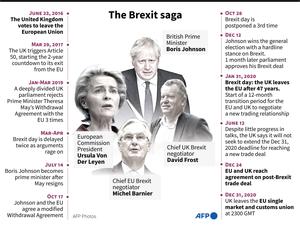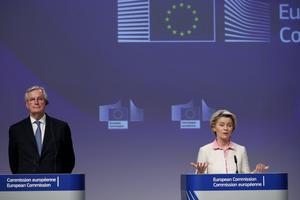
The UK clinched a historic trade deal with the European Union, averting the threat of an acrimonious breakup and laying the foundations for a new relationship with its biggest and nearest commercial partner.
Negotiators finalized the accord, which will complete Britain's separation from the bloc, on Christmas Eve, days before the country is due to leave the bloc's single market and customs union
Negotiators finalized the accord, which will complete Britain's separation from the bloc, on Christmas Eve, days before the country is due to leave the bloc's single market and customs union.
"It was a long and winding road - but we have got a deal to show for it," European Commission President Ursula von der Leyen said. “It is fair, it is a balanced deal and it is the right and responsible thing to do for both sides.”
However, not everyone was happy with the deal, which will govern the EU-UK trade and security relationship starting from Jan 1, 2021. Challenges still remain as Britain and the EU part as "old friends" in the new year.
'We have taken back control'
For Boris Johnson, the architect of Brexit and the third prime minister since the 2016 vote to leave the EU, it marks another landmark just over 12 months after he claimed a decisive mandate from voters with the promise to “get Brexit done.”
"We have taken back control of every jot and tittle of our regulation, in a way that is complete and unfettered," Johnson said Thursday during a virtual press conference at Downing Street.
According to a statement released by Downing Street, the agreement is the biggest bilateral trade deal signed by either side, covering trade worth 660 billion British pounds (US893 billion) in 2019.
"The deal also guarantees that we are no longer in the lunar pull of the EU, we are not bound by EU rules. There is no role for the European Court of Justice and all of our key red lines about returning sovereignty have been achieved. It means that we will have full political and economic independence on 1st January 2021," reads the statement.
'Fair, balanced deal' for EU
At a press conference in Brussels, European Commission President Ursula von der Leyen described the deal as "fair" and "balanced," noting that competition rules "will be fair and remain so," as EU rules and standards "will be respected."
The UK and EU will "continue cooperating in all areas of mutual interest... Together we still achieve more than we do apart," she said.
According to a press statement by the European Commission, the UK-EU agreement covers not just trade in goods and services, but also a broad range of other areas, such as investment, competition, fisheries and social security coordination.
Both parties have committed to ensuring a robust level playing field by maintaining high levels of protection in areas such as environmental protection, the fight against climate change and carbon pricing, according to the statement.
The deal also includes "a horizontal agreement on governance." A Joint Partnership Council will be established to make sure the deal is properly applied and interpreted, and in which all arising issues will be discussed.
 Britain's Prime Minister Boris Johnson holds a remote press conference to update the nation on the post-Brexit trade agreement, inside 10 Downing Street in central London on Dec 24, 2020. Britain said an agreement had been secured on the country's future relationship with the European Union, after last-gasp talks just days before a cliff-edge deadline. (PAUL GROVER / POOL / AFP)Details still to be worked out
Britain's Prime Minister Boris Johnson holds a remote press conference to update the nation on the post-Brexit trade agreement, inside 10 Downing Street in central London on Dec 24, 2020. Britain said an agreement had been secured on the country's future relationship with the European Union, after last-gasp talks just days before a cliff-edge deadline. (PAUL GROVER / POOL / AFP)Details still to be worked out
The agreement will allow for tariff and quota-free trade in goods after Dec 31, but that won't apply to the services industry - about 80 percent of the UK economy - or the financial services sector.
Firms exporting goods will also face a race to prepare for the return of customs and border checks at the year-end amid warnings of disruption at Britain's ports. The deal comes after three days of chaos at the main crossing between Britain and France offered a reminder of how quickly blockages at the border can choke international trade.
READ MORE: On the cusp of Brexit trade deal, EU & UK hash out final details
More than five turbulent years after a general election set off a chain reaction that would transform British politics and the country's connections to the rest of Europe, the deal establishes a new framework for businesses on both sides of the Channel and frees the British Parliament from many of the constraints imposed by EU membership.
With the electorate divided, public finances battered by the Covid-19 pandemic, and Scots pushing for a split from the rest of the UK, the prime minister’s next challenge is to prove that the UK can flourish outside the EU's single market and customs union, a status that puts it behind other non-members such as Norway and Switzerland when it comes to EU access.
Businesses will still face border checks for which surveys have shown that they are unprepared, and consumers in Northern Ireland face the prospect of shortages of some goods as firms adjust to the new paperwork. In a worst-case scenario, Johnson's government itself has warned of a 7,000-long line of trucks, enough to stretch from the Port of Dover to the Palace of Westminster.
Outside the EU's single market, UK financial services firms will be deprived of the passport that allows them to offer their services across the bloc and face a wait to see if the EU will grant them access
The UK got a taste of the potential chaos this week after France closed its border in response to an outbreak of a new strain of the coronavirus in Britain, leaving hundreds of lorries bound for the port of Dover backed up on local roads. To mitigate the risk, the government has built lorry parks and drivers entering Kent will require a permit or risk a fine.
Outside the EU's single market, UK financial services firms will be deprived of the passport that allows them to offer their services across the bloc and face a wait to see if the EU will grant them access - something that is still far from certain and, even if granted, could be withdrawn at any time.
Financial sector vulnerable
Outside the EU's single market, UK financial services firms will be deprived of the passport that allows them to offer their services across the bloc and face a wait to see if the EU will grant them access
That has allowed Dublin, Frankfurt, Amsterdam and Paris to start chipping away at London's dominance as Europe's financial center. Firms from JPMorgan Chase & Co. to Goldman Sachs Group Inc. are among the companies that have already shifted about 7,500 employees and US$1.6 trillion of assets out of the UK because of Brexit.
ALSO READ: EU unveils plans to avoid Brexit chaos as 'no deal' looms larger
The deal mitigates some of the immediate economic costs of leaving the EU, even if Britain's long-term growth is set to be stunted. A no-deal Brexit would have cut 1.5 percent off UK gross domestic product in 2021, according to Bloomberg Economics. But growth is still forecast to be 0.5 percentage points lower every year for the next decade than what it would have been had Britain stayed in the bloc.
 European Commission President Ursula von der Leyen, right, and European Commission's Head of Task Force for Relations with the United Kingdom Michel Barnier address a media conference on Brexit negotiations at EU headquarters in Brussels, Dec 24, 2020. (PHOTO / AP)
European Commission President Ursula von der Leyen, right, and European Commission's Head of Task Force for Relations with the United Kingdom Michel Barnier address a media conference on Brexit negotiations at EU headquarters in Brussels, Dec 24, 2020. (PHOTO / AP)
Reactions pour in
JPMorgan said the EU had secured a deal that allowed it to retain nearly all its advantages from trade with the UK but with the ability to use regulations to “cherry pick” among sectors where the UK had advantages - such as services.
The EU loses its principal military and intelligence power, 15 percent of GDP, one of the world's top two financial capitals and a champion of free markets that had acted as an important check on the ambitions of Germany and France.
Both German and French leaders welcomed the deal. German Chancellor Angela Merkel said the trade pact is "of historical importance." "The unity and strength of Europe paid off,” French President Emmanuel Macron said.
Brexit campaigner Nigel Farage said the deal would keep the UK far too closely aligned with the EU, adding that he hoped this would be the beginning of the end of the bloc.
The deal "is a disastrous Brexit outcome for Scottish farmers...and like all other aspects of Brexit, foisted on Scotland against our will," Scottish First Minister Nicola Sturgeon wrote on Twitter.
A US State Department official welcomed the agreement and said Washington wanted good relations with Britain and the EU.
The deal governing post-Brexit trade needs the approval of both the European Parliament and the EU's 27 member states. Ambassadors from EU countries will meet on Dec 25 to start reviewing the deal. The European Parliament said on Thursday it would analyse the deal in detail before deciding whether to approve the agreement in the new year.
The British parliament, as divided as the country over Brexit, will debate and vote on the deal on Dec 30, just one day before the transition period lapses.


